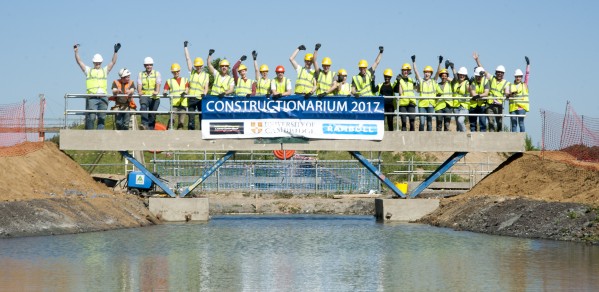
Nearly six months after starting the planning process, on 21 May 2017, 28 third year engineering students headed out to rural Norfolk to take part in a project called Constructionarium.
This project aims to provide a hands-on construction experience that allows the students the opportunity to put their theoretical knowledge gained in the engineering course thus far into practice.
This project aims to provide a hands-on construction experience that allows the students the opportunity to put their theoretical knowledge gained in the engineering course thus far into practice.
The projects constructed were scaled replicas of the Kingsgate footbridge in Durham and the Ravenspurn oil platform in the North Sea, both structures originally designed by Sir Ove Arup. The students took on all the roles in the construction teams, from the labourers to overall project managers. The expert guidance of construction tradesman and engineers ensured the safety of all work carried out, and their experience was crucial in enabling the completion of the projects in the short programme of only five days which allowed little time to make mistakes.
At the start of the planning phase, the two teams of students were provided with construction drawings of the project, and needed to develop the entire methodology, and write appropriate task sheets and risk assessments for each aspect of the project to be constructed. All aspects of the construction process were simulated, from the preparation of a tender, to temporary works designs, scheduling, budgeting, and contract reviews each evening with the client.
On site, the students all underwent a steep learning curve, and quickly gained experience and confidence, both in manual tasks, as well as in the documentation management and presentation skills when presenting their progress and costs at the end of each day. Constructionarium also provided a substantial opportunity for the students to develop essential teamwork, management, leadership, and communication skills, learning to work together and overcome challenges to achieve a common goal.
On the final day of the project everyone was in high spirits, as beautiful sunshine and a great deal of planning and hard work over the previous few days boded well for an early, successful completion of the two projects. There was nervous anticipation as the two halves of the bridge decks on the Kingsgate project were swung together to see if the tolerances on the construction would allow the bridge deck to close and bolts to fit through and secure the deck in position. After only a small amount of manoeuvring, the fit was achieved, and everyone was able to walk across the bridge and celebrate!
Similarly, across the site, the anticipation was rising together with the water level in the dry dock to see if the oil rig would float. Once it did, it was manually pulled into its final position and flooded with water to sink to the bottom of the dam. There were some tense moments as the flooding resulted in the tipping of the structure, and great relief when it finally came to rest, level and square in the middle of the dam.
The students all showed a great deal of comradery throughout the project, and returned to Cambridge with broadened horizons on the practical knowledge of construction and problem solving skills.
Ultimately, it doesn’t matter what structure is being built, the great value in Constructionarium is the in-depth understanding gained about the process of construction, including scheduling, costing, quality, safety, and all the associated procedures and documentation. This experience is able to be fed back into the further engineering modules, providing a good foundation on to which to build civil engineering knowledge in the students' final year of engineering studies.
Constructionarium is a Part IIA project offered to third year engineering students. The course is administrated by Dr. Mohammed Elshafie and Talia da Silva, and is sponsored by the Laing O’Rourke Centre for Construction Engineering and Technology at the University of Cambridge. Professional support on site is provided by Laing O’Rourke as the contractors and Ramboll as the consultants.

